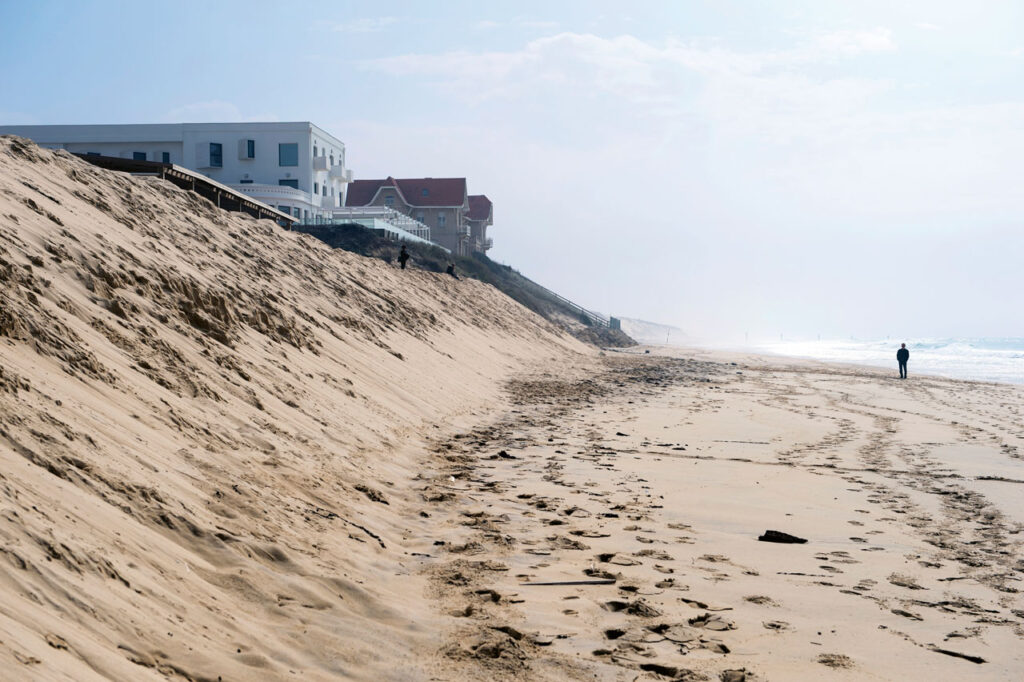[LUM#18] When the tide rises
It is an undeniable reality: sea levels are rising. This is evident in places where beaches are losing ground meter by meter and where homes with sea views sometimes find themselves with their feet in the water. How does this phenomenon occur and how can it be better managed? Beach physicist Frédéric Bouchette and economist Hélène Rey-Valette explain.

Six million people currently live in coastal communities. According to forecasts by Cerema, the center for studies and expertise on risks, the environment, mobility, and development, this figure will rise to nine million by 2040. More and more people, but less and less space: between 1950 and 2010, 27.7 km² of beaches were lost in mainland France. The cause: erosion and rising sea levels, linked in particular to global warming. "A rise of 3.2 millimeters per year over the last 20 years," says Frédéric Bouchette, a researcher at the Laboratoire
Géosciences Montpellier* and member of Gladys, the collaborative network dedicated to academic research in coastal dynamics. "This rise in water levels leads to a retreat of the shoreline, known as the coastline," explains the researcher.
Coastal resilience
However, this shift in the coastline is not a systematic phenomenon. "The coastline shows a certain degree of hydro-sedimentary resilience, i.e., the ability of beaches to adapt and/or rebuild themselves in such a way that the land is not necessarily doomed to be invaded by seawater," explains Frédéric Bouchette. Except that ... "Except that for this coastal hydro-sedimentary resilience to work, there must be enough sand, and today this is no longer the case." The main culprits are coastal developments, dykes, ports, and groynes, which block the natural movement of sand, and to a much lesser extent, dams, which re
ly retain it in rivers. "But also massive unregulated sediment extraction,
which involves tons of sand being taken from the sea for use in construction, transportation, and road infrastructure." Not to mention urbanization and infrastructure built too close to the coastline, which prevent beaches from receding naturally.
Consequence: the coastline is no longer able to adapt to rising sea levels, and in the space of 30 years, the water has eaten away an average of 100 meters of land.
"These proportions are abnormally high compared to what has been observed in the past, " says Frédéric Bouchette. And in the future? "There is a great deal of uncertainty in the evolution of the coastline; it is even one of the most complex issues in coastal research, " says the specialist, who emphasizes the importance of geophysics in developing prediction tools. "We make uncertainty projections using methods similar to those used in finance. The complexity of the intrinsic dynamics of the wave-sediment relationship makes changes difficult to predict, but the models we are developing allow us to identify trends and understand certain unique developments, such as the creation of sand spits. This information is essential for decision-makers in the sector, " insists Frédéric Bouchette.
Spatial reorganization
Raising awareness among coastal managers to anticipate the consequences of climate change is precisely one aspect of Hélène Rey-Valette's research. "Implementing policies to adapt to rising sea levels involves assessing the differences in damage with and without adaptation, " explains the researcher from the Montpellier Center for Environmental Economics (CEE-M)**. Together with economist Cécile Hérivaux from BRGM, the French Geological Survey, she has assessed the damage and benefits in the Occitanie region by 2100
for a 1-meter rise in sea level. Without adaptation? 77,000 inhabitants, 34,000 homes, and 4,600 businesses would be affected. 11,500 hectares of farmland and 570 hectares of beaches and dunes would be lost. In addition, four aquifers could potentially be affected by salinization, impacting 7.5 million cubic meters of drinking water per year. So what can be done to avoid this scenario? "Until now, we have talked about retreating, pulling back, relocating, but the idea today is to move towards spatial recomposition, " explains the economist, who sees this as a real paradigm shift involving learning to live with risk. "However, our surveys show that coastal residents do not fully appreciate the scale of the problem, mainly because of what is known as optimism bias, which means that those who enjoy the benefits of living near the beach minimize the risk. We need to study perceptions in order to inform elected officials and help them better understand the populati
."
Opportunity
One million people currently live on the coast, a population directly
affected by spatial restructuring, which will involve relocating certain neighborhoods but above all rethinking territories, taking into account all the challenges and consequences of climate change. "For example, in terms of artificialization, impermeabilization, soft mobility, energy issues, and heat islands, " adds Hélène Rey-Valette. But relocate to where? "We will need to collaborate with the inland municipalities that will face an influx of population and will have to resize the city, its schools, and its infrastructure. Those who have to move will also lose their neighborhood and their friends, so it's a complex situation," acknowledges Hélène Rey-Valette. This is where the researcher comes in, proposing solutions to make these policies economically and socially feasible. But also to find the right pace: "In terms of acceptability, we recommend bringing about gradual change, but the IPCC re
t tells us that we don't have time, so we need to help elected officials implement appropriate policies that are as progressive as possible."
For the economist, this represents a real transformation: "We will have to rethink the city as a whole and consider more reasonable and concerted approaches. From this perspective, climate change can also be seen as an opportunity to rethink our lifestyles, but we must not miss the boat."
Interview with Hélène Rey-Valette on coastal areas adapting to the risk of erosion and marine submersion exacerbated by climate change:
*GM (UM, CNRS, U Antilles)
**CEE-M (UM, CNRS, INRAE, Institut Agro)
Find UM podcasts now available on your favorite platform (Spotify, Deezer, Apple Podcasts, Amazon Music, etc.).